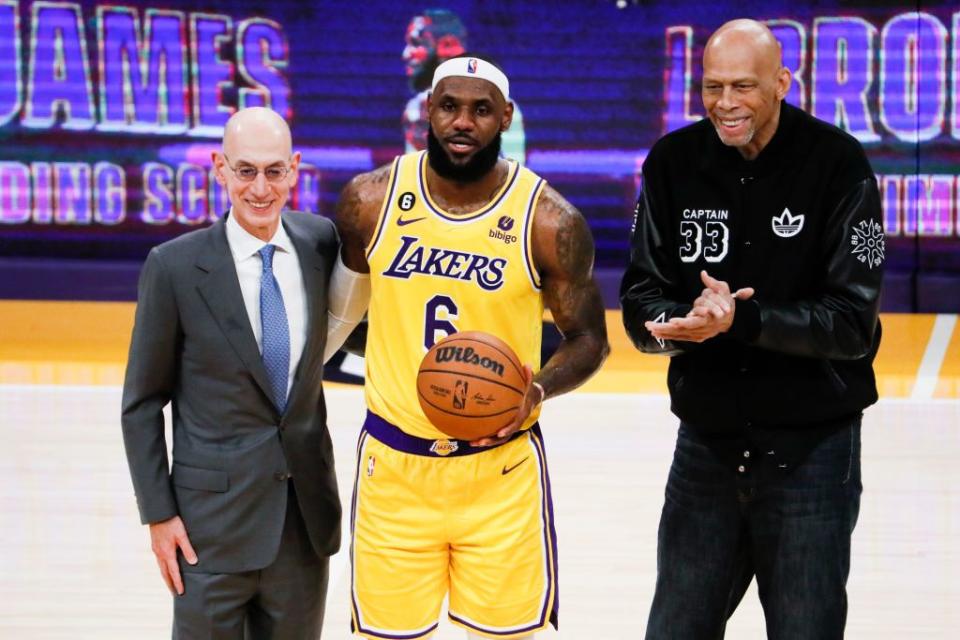The Heart of Kareem Abdul-Jabbar
You’re Kareem Abdul-Jabbar. One of the greatest athletes of the 20th century. On the court, you dominated with an unstoppable weapon—the sky hook. As you once told Esquire, “Bruce Lee said he was not concerned about someone who had practiced ten thousand kicks. He was more concerned about a person who had practiced one kick ten thousand times. I was that person.”
It worked. Until just a few weeks ago, Abdul-Jabbar held the record for most points scored in the NBA. In February, when LeBron James broke his record, Abdul-Jabbar was on hand—as he was, a few weeks later, during the All-Star weekend festivities—a once-reluctant icon, offering a calming, steady grace. For a shy man who had an appropriate mistrust of the media during his playing days, and who never had an easy alliance with reporters, has found his second act as, of all things, a writer. Not as a coach, executive, businessman, or TV blabbermouth (he’s too good of a listener to be on TV), but as an essayist, writing about everything from movies, to music, to politics, and yeah, occasionally sports.
Abdul-Jabbar’s Substack post on James setting the new record is vintage Kareem: level-headed, thoughtful, enthusiastic, and heartfelt. What’s fascinating is Abdul-Jabbar comes across now as a writer first, and an athlete second: “I begin everything I write with a lot of apprehension,” he opens the essay, “because I know how hard it is to translate complex thoughts and intense emotions into the exact words that accurately express those thoughts and emotions. But this article I approach with even more trepidation because I really want to get this right.”
Getting it right. Isn’t that what we’re all striving for? And isn’t that what’s defined Abdul-Jabbar, who is enjoying a welcome moment in the spotlight again? Getting it right, spiritually, mentally, physically. And to think he might not have been around for it. “After my career was over,” Abdul-Jabbar told Esquire over Zoom last week, “I tried to maintain health through correct diet and exercise.” So it came as a surprise when he was diagnosed with atrial fibrillation, an irregular heartbeat, in 2021.
He noticed feeling off during a trip to Europe with his son. “We were in Florence,” he says, “and I couldn’t keep up with him as we looked at the various works of art. I was a little bit disappointed, but I dismissed it.”
A few months later, Abdul-Jabbar attended a game at Dodger Stadium with some friends. “If I sat in the sun I felt like I was going to pass out. I was dizzy. I had shortness of breath and lightheadedness. I didn’t feel too good and I wanted to maybe go home. Some friends were with me. And I almost passed out completely. I did collapse, right there in the Dodgers’ hall where they have their trophies.”
Abdul-Jabbar headed straight for the hospital, where he was told he had Afib. “I never heard of atrial fibrillation,” he says. “Never. I didn’t know what it was or that it was an issue.”
Abdul-Jabbar has grandchildren now and he wants to be around to be with them. “It was a wakeup call because the whole time I thought, Hey, I’m an athlete,” he says. “It’s been a surprise but it’s better I deal with the surprise in the right way than to just let it go along on its merry way and threaten my life. I don’t want to put myself in a life-threatening situation.”

For some of us, though, going to a doctor of any kind can be unnerving—even if we understand that people with Afib are significantly more likely to have a stroke. Abdul-Jabbar is unblinking in his advice: “I would tell people who have a fear or reticence of going to the doctor it’ll be much worse if you don’t go to the doctor.”
It took a few months before Abdul-Jabbar’s symptoms started to recede. “They didn’t just go away,” he says. “I wasn’t always faithful to my therapy regimen as I had to be.” Abdul-Jabbar smiles sheepishly, then adds: “That’s changed cause I’m not going to let this persist otherwise I’m just throwing the dice and I don’t want to do that.”
Abdul-Jabbar is well aware of how perishable it all is. Forty years ago, his home in Los Angeles was destroyed in a fire. He lost a massive record collection of jazz albums. The loss seemed incalculable. “My attachment is to the music,” says Abdul-Jabbar. “It’s something you want to hear. It’s like the background to your life. And you want to hear it in a certain way. And I was very… happy …that a lot of the things I wanted to replace were reissued in compact disk format. I’ve replaced over 90 percent of the stuff that I lost. It hasn’t been as traumatic. I just had to be patient.”
And that’s what you’ve always been. Patient. Play the long game, even when it’s tough. Because what good is the music if you’re not around to hear it?
Visit No Time to Wait to learn about A Fib.
You Might Also Like


